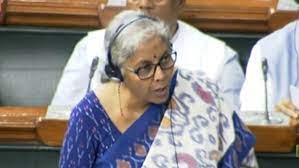Finance Bill 2023 passed in Lok Sabha: Without debate, the Lok Sabha passed the Finance Bill 2023, which implements tax proposals for the upcoming fiscal year. The passage of the Bill occurred amid Opposition uproar over the Adani controversy.
More About The Finance Bill 2023:
The Bill includes proposals for 64 official amendments, including one that seeks to eliminate long-term tax benefits for certain types of debt mutual funds and another that calls for the establishment of the GST Appellate Tribunal.
March 2023 Current Affairs Quiz
Key Amendments in the Finance Bill 2023 are:
- The Finance Bill 2023 includes several amendments, such as the taxation of mutual funds having less than 35% AUM in domestic equity as short-term capital gains and the provision of enhanced tax benefits to offshore banking units operating in GIFT City, which will receive a 100% deduction on income for 10 years.
- Furthermore, the tax on royalties and technical fees earned by foreign companies has been raised from 10% to 20%.
- Other amendments include the formation of a committee to address the pension system’s needs, and a proposal for marginal relief to limit the tax one pays to the income that exceeds Rs. 7 lakh.
- The Bill also proposes that all payments made through credit cards for foreign tours be considered under the LRS and subject to Tax Collection at Source (TCS).
- Furthermore, the Securities Transaction Tax on the sale of options has been raised from Rs. 1,700 to Rs. 2,100 on a turnover of Rs. 1 crore.
What is a Finance Bill?
It is a Bill that contains some provisions related to taxation and expenditure, and additionally contains provisions related to any other matter is called a Financial Bill.
Rule 219 of the Rules of Procedure of Lok Sabha states:
- ‘Finance Bill’ refers to the Bill that is normally introduced each year to give effect to the Government of India’s financial proposals for the following fiscal year, as well as a Bill to give effect to supplementary financial proposals for any period.
- It is a part of the Union Budget, stipulating all the legal amendments required for the changes in taxation proposed by the Finance Minister.
- There are various types of Finance Bills, the most important of which is the Money Bill. Article 110 defines the Money Bill in detail.
- The Speaker of the Lok Sabha is authorised to decide whether the Bill is a Money Bill or not. Also, the Speaker’s decision shall be deemed to be final.
- The Finance Bill, as a Money Bill, needs to be passed by the Lok Sabha — the lower house of the Parliament. Post the Lok Sabha’s approval, the Finance Bill becomes Finance Act.
